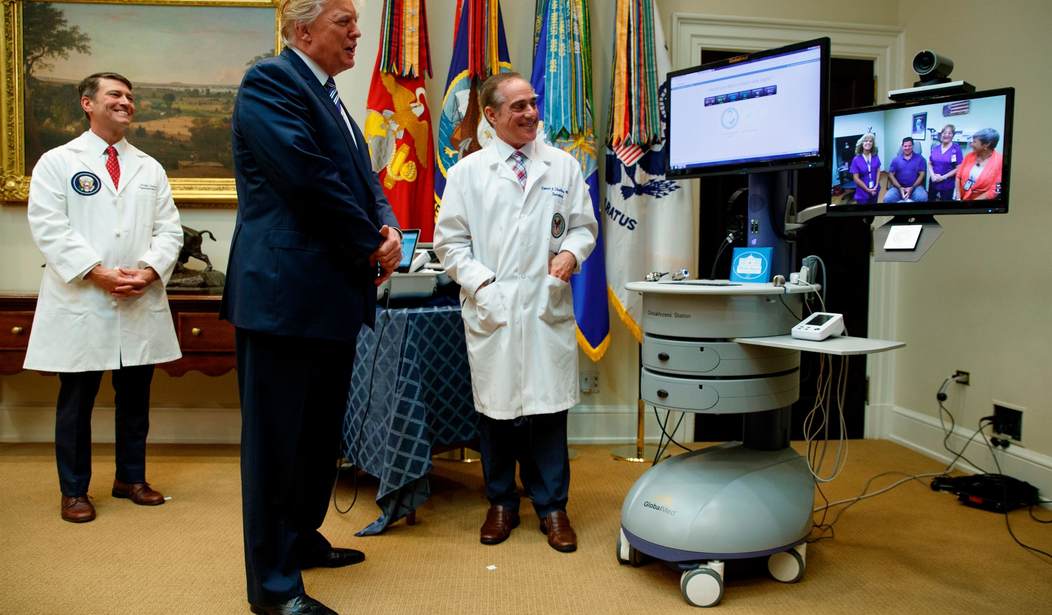At a press conference Wednesday, New York Governor Andrew Cuomo detailed changes the state is making to accommodate new cases of coronaviruses, which includes lifting several regulations that dictate, for example, how many beds can be in hospital rooms.
Cuomo was quick to add that the regulations were “all very good,” but suggested they needed to be adjusted in times of crisis.
But among the many revealing things the outbreak of COVID-19 has brought us — including a fresh reminder that China can’t be trusted to share information even when lives are at risk and what some of our national security risks actually look like — is a new look at the federal health care regime and how the Trump administration and the COVID-19 crisis may be permanently shifting the approach to health care in the U.S.
John Goodman, President of the Goodman Institute for Public Policy Research, writing at Forbes, argues the Trump administration’s policy changes in the health care sector are proving to be incredibly important during the current crisis.
[M]any of the executive actions we have seen in the past few days reflect a new approach to health policy that has been underway almost since the day Donald Trump was sworn into office.
These include the ability to be diagnosed and treated without ever leaving your own home; the ability to talk to doctors 24/7 by means of phone, email and Skype; and the ability of the chronically ill to have access to free diagnoses and treatments without losing their access to Health Savings Accounts.
In each of these areas, the Trump administration has already pushed the limits of executive authority. The “emergency” created by the coronavirus has given the administration the freedom to do much more.
Goodman also notes that doctors are freed up to treat patients across state lines, Medicare recipients can access direct primary care services, telemedicine (which in some cases is a 24/7 service) can be paid for out of Medicare funds, and employees with Health Savings Accounts can now use those funds to pay the monthly direct primary care fee.
Recommended
These are moves away from socialized medicine provision like Obamacare because it’s returning choice back to the consumer and giving them more options to use funds provided through the government assistance they do have. There’s also this significant change, writes Goodman:
"Under a Trump administration reform, employers are now allowed to provide pre-tax dollars to employees who can buy their own health insurance. This ability of employees — to have personal and portable health insurance — is another huge change from the Obama years."
On the treatment and testing side, the coronavirus crisis has also revealed what’s possible when federal agencies relax their regulatory regime to respond to a need. The Food and Drug Administration can take anywhere from 10 to 12 years to approve new therapies and drugs, but in times of crisis, they have several fast-track options, including an emergency use option, they could employ to roll out treatments and vaccines much sooner. In fact, in Seattle Monday, doses were administered in an “in-human” test for a coronavirus vaccine. This is a radical departure from how the FDA works. Usually animal testing comes first.
And while the FDA has relaxed some of their regulatory requirements in approving a new test on a fast track and allowing states to use it, there’s some question as to how far the FDA is willing to go.
According to the Wall Street Journal, the Trump administration had “considered issuing an executive order greatly expanding the use of investigational drugs against the new coronavirus, but was met with objections from Food and Drug Administration scientists who warned it could pose unneeded risks to patients, according to a senior government official.”
However, at a press conference Wednesday of the White House’s coronavirus task force, Trump teased that he would be revealing some “exciting” developments related to the FDA. Much in the way Trump “persuaded the major insurance company executives to orally agree to waive deductibles and copayments to encourage potential coronavirus victims to get tested and treated,” it sounds like he may have convinced the FDA to get their regulatory regime out of the way to save lives.
In short: the Trump administration had already begun laying the groundwork for a less stringent federal health care regulatory regime. The coronavirus may just be what pushes the U.S. toward adopting them permanently.
Sarah Lee is freelance writer and policy wonk living and working in Washington, DC.

























Join the conversation as a VIP Member